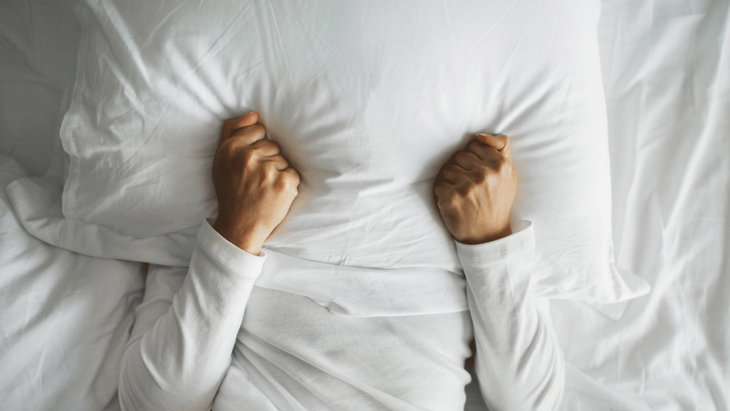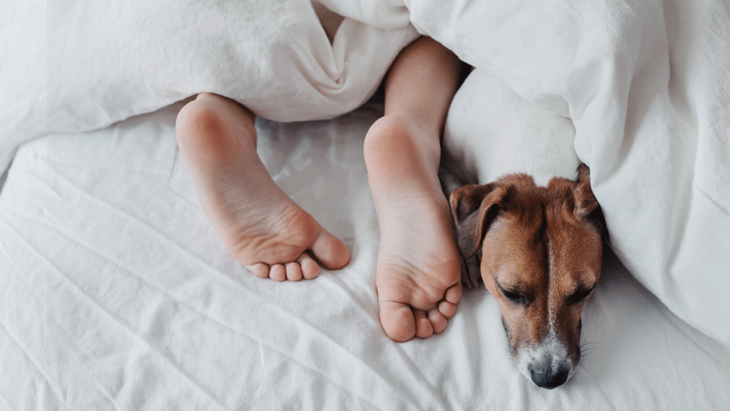8 Myths About Sleep That Experts Want You to Stop Believing Right Now
This article originally appeared on Outside
Despite the fact that advice on how to sleep better is everywhere, it's becoming more and more challenging--not to mention frustrating--to find reliable information.
Social media, exaggerated product claims by brands, even doctors who lack education can perpetuate myths around sleep, says Pedram Navab, a doctor of osteopathic medicine, neurologist, sleep medicine specialist, and author of Sleep Reimagined: The Fast Track to a Revitalized Life.
The alternative to falling for false assertions is familiarizing yourself with advice from experts who understand the science of sleep. The following insights will help ensure you don't lose another night's rest.
8 Sleep Myths (and the Science That Debunks Them)
1. You Shouldn't Exercise Before You Go to Bed
Research has long supported the fact that exercise can improve your sleep quality. Although a single workout can bring positive results, the more regularly you work out, the more likely you are to sleep better.
Until recently, experts cautioned against exercising close to when you turn in for the night. Not anymore. "For most people, exercising at night won't get in the way of sleep," says Michael Grandner, PhD, associate professor of psychiatry at the University of Arizona College of Medicine and lead scientific advisor to Sleep Reset, a personalized sleep program.
Proof lies in a 2019 review of sleep studies that concluded evening exercise didn't adversely affect quality of sleep in subjects. In fact, it seems to have improved it. The only exception were those who practiced high-intensity exercise, such as running or cycling, within an hour of trying to fall asleep. Many of these subjects reported experiencing difficulty falling asleep and poorer quality sleep.
If you're a late-night exerciser and suspect exercise is messing with your rest, try working out earlier or lowering the intensity of your nighttime routine. You could even try restorative yoga or Yoga Nidra, or a hybrid yoga class that begins with a fast-paced sequence and slowly settles into long-held stretches known as Yin Yoga.
2. It's Only What You Do At Night That Matters
Yes, everyone knows that consuming caffeine and taking long naps can stifle sleepiness hours after the fact. But there are less obvious daytime behaviors that can influence your ability to fall asleep. Notably, stress. Scientific research has shown us again and again that stress and sleep engage in a complicated relationship.
"We think 'I'm going to be up all day working and then I'm going to turn my life off," says Shelby Harris, PsyD, a behavioral sleep medicine provider and sleep expert with Calm, the sleep and meditation app and mental health brand. "But as sleep informs the day, the day informs sleep." Harris suggests that you think of sleep on a 24-hour continuum as a reminder to "pay attention to all the ways you manage your physical and emotional health throughout the day, which in turn influences your ability to sleep."
She suggests getting outside to ensure adequate exposure to natural light, which can reset your circadian rhythm. Also, Harris says, taking brain breaks as needed or whatever else helps you be at a better baseline. One thing she regularly recommends is meditation.
"When you meditate during the day, you cultivate a life of mindfulness and notice when your brain is talking so much, and you learn to bring it back," says Harris. "It makes it easier for them to use meditation at night when the stakes seem higher. You can say, 'Nope, not now, back on track.'"

3. Lying in Bed With Your Eyes Closed Counts
Technically, yes, lying in bed awake with your eyes closed constitutes rest. But it's no substitute for sleep. Ironically, that well-intentioned behavior could actually set you up for continued sleep disruption.
According to Grandner, remaining in bed when you can't sleep is the most common behavior that can turn short-term sleep issues into long-term insomnia. "You're creating a wake association with the bed," says Grandner. This means your body and mind get used to not sleeping in bed, which can make falling asleep more stressful and keep you awake.
If you've been lying awake for more than 20 minutes or are getting frustrated, get out of bed and do something relaxing, says Grandner. For instance, meditate or read a non-stimulating book in a dimly lit room. As soon as you start feeling tired, head back to bed. Resist the urge to look at any digital device while you're up. The device could stimulate your mind too much to fall back asleep and the blue light could mess up your production of melatonin, a sleep-inducing hormone, according to the Sleep Foundation.
4. You Need 8 Hours of Sleep
For years, we were told that we needed eight hours of sleep. While it's possible eight hours is what you need, not everybody requires that amount. Some may need a little more, some a little less, Harris says.
The confusion arose, says Harris, when the National Sleep Foundation recommended that adults log between seven and nine hours of sleep. But somehow that was misunderstood as a single-digit average that applied to everyone.
In fact, in terms of cognitive performance, less may actually be okay. A study in the journal Brain revealed that somewhere between 5.5 and 7.5 hours could do the trick, the sweet spot being 6.5 hours, Navab says.
5. There's Nothing Wrong With Hitting the Snooze Button
You know the scenario. You hear the alarm clock go off in the morning and you slap the snooze button...not just once, but twice, thrice, sometimes more. Although some of us might think it's helpful to gradually awaken, science suggests that relying on the snooze button could mess up your sleep patterns in several ways.
First, relying on the snooze function interrupts your sleep cycle, only to start a new one that's interrupted again. "This can lead to sleep fragmentation, which may leave you feeling groggy and less refreshed after waking up," Navab says. This is known as sleep inertia, a state of grogginess and cognitive impairment that can linger after waking. Translation? Less productivity.
Plus, if you're not consistent with your wake-up times, you could disrupt your body's internal clock. As a result, you may have trouble falling asleep at night, Navab says. It could even lead to long-term sleep disorders.
Instead, set your alarm for the exact time that you want to get out of bed. Then--this demands some discipline--resist the urge to snooze. If necessary, place your alarm several feet from your bed so you have to actually get out of bed to turn it off.
6. You Can Make Up For Lost Sleep
Everyone knows someone who insists that when they skimp on sleep during the week, they can easily catch up on the weekend. If only this were true.
Sleep consists of different stages. Each fulfills a critical role. It's the deep, or restorative, stage that is often sacrificed with diminished sleep. During this stage, your body literally restores itself at the cellular level by repairing damage to tissues, bolstering the immune system, and engaging in neural reorganization.
"When you consistently deprive yourself of sleep, your body and brain experience a deficit in the amount of restorative sleep that's required for optimal performance," says Navab. Those deficits accrue over time and can't be reclaimed.
What's more, when you try to make up for that sleep, you could make things worse. Your internal clock, also known as your circadian rhythm, is regulated by consistency in your sleep patterns. "Attempting to regain lost sleep can disrupt this rhythm and make it more difficult to attain the benefits," says Navab.
So what do you do after a crappy night or two of tossing and turning? Take a nap. Navab considers daytime sleep to be productive and beneficial as long as you follow two rules: Schedule it for no later than 1 pm and nap for no longer than 30 minutes. Otherwise, you could disrupt your sleep later that night. If you're a shift worker, take a nap before leaving for work.
7. You Can Train Your Body To Get By With (A Lot) Less Sleep
You can train your body to do incredible things. Climb a fourteener in Colorado. Hit a PR in a 10k. Nail Crow Pose in yoga class. But train it to get less sleep? In your dreams.
When researchers study sleep deprivation, they find that people feel like they're adjusting to less sleep and report being less impaired, Grandner says. In reality, though, they're functioning poorly, both physically and psychologically.
According to the Centers for Disease Control and Prevention, staying awake for 17 hours elicits the same effects as having a blood alcohol concentration (BAC) of .05 percent (.08 percent BAC is when you're legally impaired). That rises to .10 percent if you've been awake for 24 hours.
"Brain function and other effects of sleep loss continue to increase over time," says Grandner. "People may not notice anymore, though, because they start getting used to being impaired."
Also, without proper sleep, you're more likely to gain weight, lack energy, develop high blood pressure and diabetes, be more prone to getting a cold or the flu as well as take longer to recover. And that's the short list.
There's no getting around it: You've got to give your body the sleep it needs.

8. Slumbering With Your Four-Pawed Friend is Bad
According to the Center for Sleep Medicine, 56 percent of pet owners let their cats or dogs bunk with them at night. Although experts have warned against this behavior for years, there may not be any substantiation for it. In fact, recent studies suggest co-sleeping with your pet may be less disruptive than sleeping alongside another human.
Navab says that for many of us, allowing a furry companion in bed can help relieve anxiety and promote relaxation. "Pets can potentially improve insomnia," he says, explaining that the nightly routine you create for your pet can help you establish a consistent bedtime routine for yourself, which promotes a "robust homeostatic drive to sleep."
So permission granted...sort of. The results are highly individual, cautions Navab. If allergies (yours) or noisy and disruptive behavior (theirs) become an issue, you may need to try keeping them out of your sleeping quarters and see if your rest patterns change. As with humans, it seems not everyone will make an ideal nighttime companion.
About Our Contributor
Karen Asp is an award-winning journalist who specializes in health, fitness, nutrition, travel, and animals. She's been widely published in numerous leading publications, including Better Homes & Gardens, O, Real Simple, Eating Well, Women's Health, Prevention, and more. She's also the author of Anti-Aging Hacks, a certified personal trainer, and Nordic walking world record holder who spends her spare time rescuing and fostering dogs.
For exclusive access to all of our fitness, gear, adventure, and travel stories, plus discounts on trips, events, and gear, sign up for Outside+ today.

